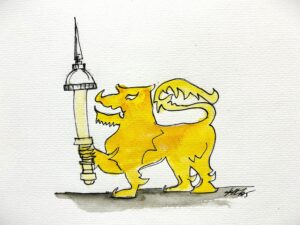Tamil Guardian editorial, June 2, 2025
There was a marked shift in global politics last week as states around the world, including staunch allies of Israel, began to criticise its ongoing military offensive in Gaza. It comes as a senior United Nations humanitarian official repeatedly issued a stark reminder of the international community’s failure to prevent genocide previously, pointing specifically to Sri Lanka. This was not just an acknowledgement of past atrocities. It was a reminder and a warning. The failure to protect vulnerable populations, to prevent their recurrence, and to punish the perpetrators of mass atrocities allows genocide to flourish again and again.
The massacres unfolding in Gaza, which have stretched on for more than a year and a half, have not occurred in a vacuum. Genocide is never spontaneous. It is enabled by political and military environments that either quietly sanction or openly support such crimes. This was certainly the case for Sri Lanka, where the state’s genocidal offensive against the Tamil nation was met not with resistance, but with endorsement from powerful actors across the world.
At the time, Colombo guised its genocide as part of the “war on terror”, a narrative eagerly adopted by states worldwide across the political spectrum – from the United States and China, to India and Pakistan. With the Liberation Tigers of Tamil Eelam (LTTE) proscribed in countries across the globe, Sri Lanka was emboldened to wage a devastating campaign. It used foreign financial aid, diplomatic cover, and global military hardware to shell hospitals, execute surrendering Tamils, and starve civilians. The resulting carnage has now been well documented, including in UN reports. That the world did not act to stop the killings in the Vanni is a moral failure that Tom Fletcher, UN Emergency Relief Coordinator, has now invoked repeatedly when speaking about Gaza.
But the world’s failure did not end in 2009. In the years since, no one has been held accountable for the atrocities. Not a single soldier, commander, or political leader has been brought to justice. Instead, successive Sri Lankan governments have been rewarded with years of diplomatic engagement and military partnerships. The impunity that Sri Lanka enjoys has set disturbing precedents. The result? A global blueprint for how to get away with genocide.
This is not an exaggeration. States such as Nigeria and Myanmar have openly spoken of the ‘Sri Lanka’ model for crushing insurgencies. And as Tamils and Palestinians have repeatedly pointed out, the parallels between Mullivaikkal and Gaza are chilling; the deliberate denial of humanitarian aid, the forced confinement of civilians into ever-shrinking strips of land, the relentless bombings of hospitals and shelters. Last month, even an Israeli security expert made the comparison openly in the Jerusalem Post, noting how Sri Lanka’s swift and brutal offensive, which came at the cost of tens of thousands of Tamil lives, met only “muted” international condemnation.
It is therefore no surprise that when speaking on the failures to prevent massacres in Gaza, Sri Lanka is now being held up alongside Srebrenica and Rwanda. But recognition alone is not enough. Genocide cannot be met with statements of concern or retrospective lamentation.
If the international community is sincere in its commitment to “never again” allow such horrors to occur, then it must take concrete steps to demonstrate that mass atrocities will not go unpunished. It must pursue international prosecutions, as well as impose sanctions. And it must ensure that victims – Tamil, Palestinian, or otherwise – are no longer made to suffer in silence. States looking at recognition of the Palestinian state as a form of remedial justice must also explore supporting Tamil self-determination.
Sri Lanka has become a blueprint, not because it offers a path to peace, but because it shows how to commit genocide and escape the consequences. If that precedent is allowed to stand unchallenged, the world should expect that others will follow it. The failure to deliver justice did not just betray the Tamil people. It undermined the very foundations of international law. The cost of that failure is being paid again in Gaza.
